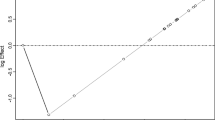Abstract
With residential treatment services under pressure to produce outcome data, the process of executing research in such settings presents considerable challenges. This paper describes how a large, decentralized, community-based residential treatment program in southern and central Maine designed and implemented a research outcome process study using standardized measures on a variety of dimensions. The study’s rationale, process, challenges and findings are presented. Results indicated that the challenges to this work were minimized due to careful planning and collaboration by and with administration and treatment staff. Unique to this work was the process where a formal research approach was used in the context of a private, geographically diverse organization.
Similar content being viewed by others
References
American Association of Children’s Residential Treatment Centers. (1999). Outcomes in children’s residential treatment centers: A national survey. Washington, DC: Author.
Bates, B. C., English, D. J., & Koudiou-Giles, S. (1997). Residential treatment and its alternatives: A review of the literature. Child & Youth Care Forum, 26, 7–51. doi:10.1007/BF02589364.
Boyd, A. S., Einbinder, S. D., Rauktis, M. E., & Portwood, S. G. (2007). Building research capacity in residential treatment centers: An approach for empirical studies. Child & Youth Care Forum, 36, 43–58. doi:10.1007/s10566-006-9030-y.
In: Burns, B. J., & Hoagwood, K. (Eds.). (2002). Community treatment for youth: Evidence-based interventions for severe emotional and behavioral disorders. New York: Oxford University Press.
Busch, M. (2003). Outcome measures in residential group care: A state association model project, part II. Residential Group Care Quarterly, 4, 2–3.
Butler, L. S., & McPherson, P. M. (2007). Is residential care misunderstood? Journal of Child and Family Studies, 16, 465–472. doi:10.1007/s10826-006-9101-6.
Child Welfare League of America. (2008). Residential transitions project-phase one: Final report. VA: Arlington.
Davidson, R. J. (2000). Affective style, psychopathology, and resilience: Brain mechanisms and plasticity. The American Psychologist, 55, 1196–1214. doi:10.1037/0003-066X.55.11.1196.
Foltz, R. (2004). The efficacy of residential treatment: An overview of the evidence. Residential Treatment for Children & Youth, 22(2), 1–19. doi:10.1300/J007v22n02_01.
Frensch, K. M., & Cameron, G. (2002). Treatment of choice or a last resort? A review of residential mental health placements for children and youth. Child & Youth Care Forum, 31, 307–339. doi:10.1023/A:1016826627406.
Gerard, A. B. (1994). Parent–child relationship inventory (PCRI). Los Angeles, CA: Western Psychological Services.
Hair, H. (2005). Outcomes for children and adolescents after residential treatment: A review of the literature from 1993 to 2003. Journal of Child and Family Studies, 14(4), 551–575. doi:10.1007/s10826-005-7188-9.
Hoagwood, K., Burns, B. J., Kiser, L., Ringelsen, H., & Schoenwald, S. K. (2001). Evidence-based practice in child and adolescent mental health services. Psychiatric Services, 52, 1179–1189. doi:10.1176/appi.ps.52.9.1179.
Horesh, N., Rolnick, T., Iancu, I., Dannon, P., Lepkifkere, E., Apter, A., et al. (1997). Anger, impulsivity and suicide rise. Psychotherapy and Psychosomatics, 66, 92–96.
Jackson-Walker, S., Wall, J. R., & Minnich, H. M. (2003). IARCCA outcome project special report: An analysis of outcome measures for children in residential care, transitional living, and foster care. Indianapolis, IN: IARCCA.
Leventhal, B., & Zimmerman, D. P. (2004). Residential treatment: Preface. Child and Adolescent Psychiatric Clinics of North America, 13, xv–xvii. doi:10.1016/S1056-4993(03)00114-7.
Liebert, T. W. (2006). Making change visible: The possibilities in assessing mental health counseling outcomes. Journal of Counseling and Development, 84, 108–113.
Little, M., Kohm, A., & Thompson, R. (2005). The impact of residential placement on child development: Research and policy implications. International Journal of Social Welfare, 14, 200–209. doi:10.1111/j.1468-2397.2005.00360.x.
Lyons, J. S. (2004). Redressing the emperor: Improving our children’s public mental health system. Westport, CT: Praeger.
McCall, R. B., & Green, B. L. (2004). Beyond the methodological gold standards of behavioral research: Considerations for practice and policy. Social Policy Report, 18(2).
Naglieri, J. A., LeBuffe, P. A., & Pfeiffer, S. I. (1994). Devereux scales of mental disorders manual. San Antonio, TX: Harcourt Brace & Company.
Novaco, R. W. (2003). The Novaco anger scale and provocation inventory (NAS-PI) Manual. Los Angeles, CA: Western Psychological Services.
Pfeiffer, S. I., & Shott, S. (1996). Implementing an outcome assessment project: Logistical, practical, and ethical considerations. Residential Treatment for Children & Youth, 13, 71–81. doi:10.1300/J007v13n04_04.
Prince-Embury, S. (2007). Resiliency scales for children and adolescents-a profile of personal strengths manual. Antonio, TX: Harcourt Assessment.
Ramírez, J. M., & Andreu, J. M. (2007). Aggression, and some related psychological constructs (anger, hostility, and impulsivity); some comments from a research project. Neuroscience and Biobehavioral Reviews, 30, 276–291. doi:10.1016/j.neubiorev.2005.04.015.
Siegel, D. J. (1999). The developing mind: How relationships and the brain interact to shape who we are. New York: Guildford Press.
US Department of Health and Human Services. (1999). Mental health: A report of the Surgeon General—executive summary. In M. D. Rockville (Ed.), US Department of Health and Human Services, Substance Abuse and Mental Health Administration. USA: Center for Mental Health Services, National Institutes of Health, National Institute of Mental Health.
US Department of Health, Human Services. (2003). New Freedom Commission on Mental Health, achieving the promise: Transforming mental health care in America-final report. (DHHS Publication No. SMA-03–3832). Washington, DC: US Government Printing Office.
US Public Health Service. (2000). Report of the Surgeon General’s Conference on Children’s mental health: A national action agenda. Washington, DC: US Government Printing Office.
Whittaker, J. D. (2000). What works in residential child care and treatment: Partnerships with families. What Works In Child Welfare? Mt. Morris, IL: CWLA Press.
Whittaker, J. K., Greene, K., Schubert, D., Blum, R., Cheng, K., Blum, K., et al. (2006). Integrating evidence-based practice in the child mental health agency: A template for clinical and organizational change. The American Journal of Orthopsychiatry, 76, 194–201. doi:10.1037/0002-9432.76.2.194.
Whittaker, J. D., & Pfeiffer, S. I. (1994). Research priorities for residential group care. Child Welfare, 73, 583–601.
Author information
Authors and Affiliations
Corresponding author
Rights and permissions
About this article
Cite this article
Butler, L.S., Little, L. & Grimard, A.R. Research Challenges: Implementing Standardized Outcome Measures in a Decentralized, Community-based Residential Treatment Program. Child Youth Care Forum 38, 75–90 (2009). https://doi.org/10.1007/s10566-009-9065-y
Received:
Accepted:
Published:
Issue Date:
DOI: https://doi.org/10.1007/s10566-009-9065-y




